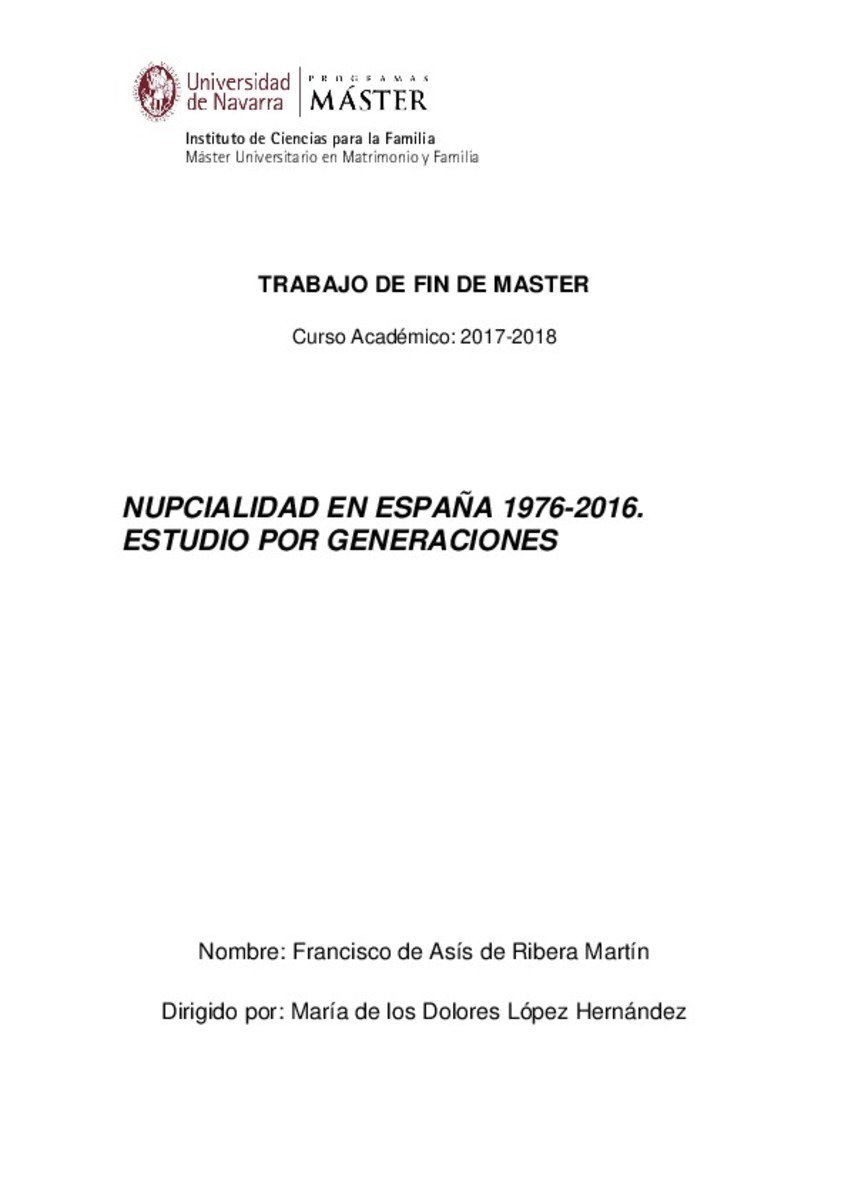Full metadata record
| DC Field | Value | Language |
|---|---|---|
| dc.contributor.advisor | López-Hernández, D. (Dolores) | - |
| dc.creator | Ribera-Martín, F.A. (Francisco de Asís) de | - |
| dc.date.accessioned | 2019-10-18T10:22:22Z | - |
| dc.date.available | 2019-10-18T10:22:22Z | - |
| dc.date.issued | 2018-10 | - |
| dc.date.submitted | 2018-10 | - |
| dc.identifier.citation | Ribera-Martín, F.A. Nupcialidad en España 1976-2016. Estudio por generaciones (Trabajo Fin de Máster). Universidad de Navarra, Pamplona | es_ES |
| dc.identifier.uri | https://hdl.handle.net/10171/58347 | - |
| dc.description.abstract | En España en las últimas décadas se han producido muchos cambios en los fenómenos demográficos (envejecimiento de la población, mayores migraciones, retraso en la edad del matrimonio, mayor preferencia de otro tipo de uniones con una decreciente preferencia del matrimonio, aumento del divorcio) en un entorno de también muchos cambios sociales y normativo (con nuevas leyes como la del divorcio exprés). Todo ello lleva a que la lectura de los indicadores de nupcialidad desde una perspectiva trasversal sea más compleja ya que se acumulan diferentes efectos. La perspectiva longitudinal o de generaciones utilizada en este estudio permite separar y medir mejor estos efectos y diferenciar las realidades coyunturales de los patrones generacionales. Ambas perspectivas son complementarias y se confirma, entre otras cosas, una nupcialidad decreciente, a edades más tardías y con mayor y creciente preferencia por lo civil. | es_ES |
| dc.description.abstract | In Spain, there have been many changes in demographic phenomena in the last decades (aging of the population, greater migrations, delay in the age of marriage, greater preference of other types of unions with a declining preference of marriage and an increasing number of divorces) in an environment of many social and legislative changes (with new laws such as “ley del divorcio exprés”). All these things lead to a more complex reading of the nuptiality indicators in a cross-sectional study that aggregates different effects. The cross-sectional perspective of generations used in this study allows separating and making a better measure of these effects and differentiating temporary realities from generational patterns. Both perspectives are complementary and confirm, among other things, a decreasing level of nuptiality, at a later age and with a greater and rising preference for civil ceremonies. | es_ES |
| dc.language.iso | spa | es_ES |
| dc.rights | info:eu-repo/semantics/openAccess | es_ES |
| dc.subject | Nupcialidad | es_ES |
| dc.subject | Matrimonio | es_ES |
| dc.subject | Cohortes | es_ES |
| dc.subject | Generaciones | es_ES |
| dc.subject | Microdatos | es_ES |
| dc.subject | Edad al matrimonio | es_ES |
| dc.subject | Matrimonio canónico | es_ES |
| dc.subject | Matrimonio civil | es_ES |
| dc.title | Nupcialidad en España 1976-2016. Estudio por generaciones | es_ES |
| dc.type | info:eu-repo/semantics/masterThesis | es_ES |
Files in This Item:
Statistics and impact
Items in Dadun are protected by copyright, with all rights reserved, unless otherwise indicated.






